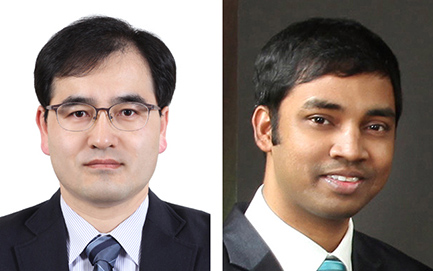YU Research Team Raises Efficiency of ‘Cancer Medicine’! N
No.88764- Writer pr
- Date : 2015.04.07 14:49
- Views : 8749
College of Pharmacy Professor Kim Jong-oh's research team produces effective drug carriers with higher internal safety
Basis for developing cancer medicine with low side effects and high anti-cancer effects
Published in latest issue of 'Chemical Communications', a prominent international academic journal in the chemistry sector
[2015-4-1]
Basis for developing cancer medicine with low side effects and high anti-cancer effects
Published in latest issue of 'Chemical Communications', a prominent international academic journal in the chemistry sector
[2015-4-1]

<College of Pharmacy Professor Kim Jong-oh (left) and Dr. Thiruganesh Ramasamy>
A YU research team succeeded in producing nano-particle drug carriers that can be used as cancer medicine with low side effects and high anti-cancer effects.
The research team used Doxorubicin and Irinotecan, which are drugs that suppresses 'Topoisomerase I and II', enzymes that exist in large amounts in cancer cells, to form a polymer electrolyte complex through static coupling, and then specially coated it with bio-friendly lipid membrane to create a nano-particle drug carrier with higher stability in the body and effective drug carrying features.
The research team used Doxorubicin and Irinotecan, which are drugs that suppresses 'Topoisomerase I and II', enzymes that exist in large amounts in cancer cells, to form a polymer electrolyte complex through static coupling, and then specially coated it with bio-friendly lipid membrane to create a nano-particle drug carrier with higher stability in the body and effective drug carrying features.
The research results made by YU Professor of Pharmacy Kim Jong-oh (40) and Thiruganesh Ramasamy (32), from India who earned his PhD in pharmacology at the YU Graduate School of Pharmacy were published in the April 2015 issue of <Chemical Communications (IF (impact factor) = 6.718)>, which is a prominent international academic journal published by the Royal Society of Chemistry in England.
Normally during cancer treatment, combination therapy that uses two or more anti-cancer drugs is used to enhance the anti-cancer effect. Combination therapy is designed empirically based on the max prescription (max amount administered without having harmful reactions due to drugs) of two different anti-cancer drugs and thus has synergy effects within the body. In actual clinical trials, however, synergy effects can drop considerably or result in severe side effects such as suppression of immune system or cardiotoxicity. Therefore, the development of 'Ratiometric nanomedicine' that can exactly adjust emissions for the concentration and ratio of drugs by carrying the two drugs simultaneously in the cancer area when administering to cancer patients has been in demand.
The nano-particle drug carrier produced was found not only to have high anti-cancer effects, but also considerably lower side effects, so it is expected to become a basis for development of new drugs that can be used in cancer treatment in the future.
Professor Kim Jong-oh, who participated in this study as a corresponding author, said, "The cancer drug emission control technology developed through this study can be used to raise efficiency and lower toxicity when developing new therapy methods or when developing drugs with biological effects and that are disease specific," and added, "By providing important platform technologies in the drug carrying sector, it can raise the competitiveness of the domestic pharmaceutical industry by linking to the development of high value products in which various drug lines can be applied."
Currently, the research team is engaged in studies for attaching substances that interact with specific proteins on the surface of cancer cells so that the nano-particles can be applied to just specific cancer cells. In December of last year, they developed 'pH Reacting Multi-layer Film Nano-Particle Drug Carriers' and published it in an internationally prominent academic journal in the bio-materials sector, <Acta Biomaterialia (IF=5.684)>, and has been actively carrying out research related to the development of nano-particle drug carriers.
Currently, the research team is engaged in studies for attaching substances that interact with specific proteins on the surface of cancer cells so that the nano-particles can be applied to just specific cancer cells. In December of last year, they developed 'pH Reacting Multi-layer Film Nano-Particle Drug Carriers' and published it in an internationally prominent academic journal in the bio-materials sector, <Acta Biomaterialia (IF=5.684)>, and has been actively carrying out research related to the development of nano-particle drug carriers.